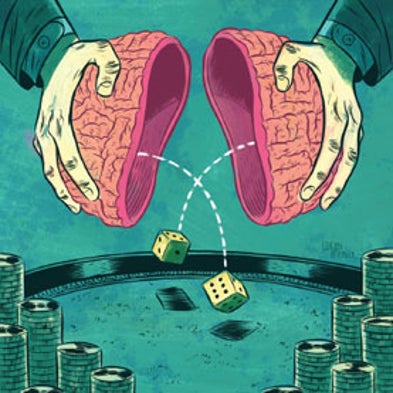BETFAIR: WHY WE LOVE TO LOSE
Betfair has made tens of millions
of pounds by taking money from losers (literally speaking) like me. But how does Betfair persuade me to lose over and over again, and enjoy it?
THE BETTERS’ BRAIN
So, why is gambling appealing in
the first place? The answer lies in positive
reinforcement (Skinner, 1938). Just how a dog repeats a behaviour to
receive a treat, a gambler repeats behaviour to receive money. This phenomenon lies
in our evolutionary ‘advantageous’ reward
circuit. When gambling, dopamine is released creating a positive feeling similar
to responses to food, sexual stimuli and even cocaine. But how does a natural
neurotransmitter make people love betting on horses? This is because addictive
gamblers have a hypersensitivity to rewards and so feel even better than most when
their bet comes through (Hewig, 2010). On top of that, addicts show the same activity
when only almost winning (Oberg et
al, 2011). This leads to persistence and vigour in the behaviour as they love
to play even if they are not winning.
Another reason gambling can be so
addictive is because it creates a variable schedule of reinforcement (SOR) as rewards occur on a random,
unpredictable basis (Pryor, 1985). Consequently, behaviour is maintained as
gamblers believe the next bet will be
lucky, but that luck may never come. Additionally, the long interval SOR causes
powerful reinforcement as rarity heightens the satisfaction of a monetary
reward. So that’s why I feel so good
when I finally win a couple of pounds.

TAP TAP BOOM
One of Betfair’s advertisements uses the slogan ‘tap tap
boom’. This could be because it is fun to say, or it could be to emphasize the
ease of betting. In terms of Ajzen’s Theory of Planned Behaviour, the
consumers’ perceived behavioural control
(PBC) is manipulated (Ajzen, 1991). PBC is a person’s subjective perception
of how easy it is to perform a behaviour and is determined by control beliefs about what factors could prevent a behaviour. The advert
demolishes any control beliefs as it highlights how there are no barriers stopping
you from throwing your money away! Therefore, my belief (wanting to bet) is more
likely to be translated into behaviour (betting) and I give Betfair what they want
(money).
In addition, whenever you place a bet, a big, green BOOM appears
on your screen which, in my experience, elicits a feel of satisfaction. I
believe this to be similar to clicker training in that I have associated this conditioned stimulus with the real reinforcer, money, as the two occur in
conjunction. Consequently, I’m left grinning whilst I throw my money
away.

THE
CASH-OUT COWARD
Another Betfair technique comes in the form of a Cash-out
scheme: if your bet is on the cards, Betfair will give you the option to take a
smaller reward rather than risk it not paying off. This may seem generous but
Betfair are actually manipulating risk
aversion perfectly. Expected Utility
theory posits that risk averse individuals have a diminishing value of
rewards (a concave utility function) and therefore, most gamblers do not value
the possible larger payoff. Subsequently, Betfair lose less money even though
the odds are in the favour of the gambler. Conversely, as Prospect Theory predicts, gamblers will rarely cash out when the
offer is less than their deposit due to a risk seeking tendency (a convex
utility function) in the loss domain. Gamblers would rather persist in the off
chance their bet succeeds and so Betfair usually receive the whole deposit. So,
to conclude, my cowardliness is a source of money for Betfair.

NOT
SO FREE BETS
Betfair’s
latest offer states that if you place £50 on bets you get £20 free! This looks amazing
from afar however Reciprocity is a
strong notion. One example of the phenomenon is shown by Heilman et al (2011) who
found that taking free samples at Costco
increased individuals likelihood of buying from a brand. Similarly, by
promising us gamblers free bets, we subconsciously feel like we owe the company
something i.e. our loyalty and, of
course, money. In addition, I have observed that with free bets, I am more
likely to bet on unlikely occurrences because the thought of free money somehow overrides
my usual cowardliness. This develops a high
risk appetite and may encourage me to bet on unlikely outcomes in the
future. I never win high risk bets and Betfair laugh their way to the bank.

Who knew Betfair could persuade me to waste my student loan. I guess I'll always be a loser.
References
Ajzen, I. (1991). The theory of planned behavior. Organizational behavior and human decision processes, 50(2), 179-211.
Heilman, C., Lakishyk, K., & Radas, S. (2011). An empirical investigation of in-store sampling promotions. British Food Journal, 113(10), 1252-1266.
Hewig, J., Kretschmer, N., Trippe, R. H., Hecht, H., Coles, M. G., Holroyd, C. B., & Miltner, W. H. (2010). Hypersensitivity to reward in problem gamblers. Biological psychiatry, 67(8), 781-783.
Kahneman, D., & Tversky, A. (1984). Choices, values, and frames. American psychologist, 39(4), 341.
Oberg, S. A., Christie, G. J., & Tata, M. S. (2011). Problem gamblers exhibit reward hypersensitivity in medial frontal cortex during gambling. Neuropsychologia, 49(13), 3768-3775.
Pryor, K. (1985). Don't shoot the dog! Toronto: Bantam Books.
Skinner, B. F. (1938). The behavior of organisms: an experimental analysis. Appleton-Century. New York.

No comments:
Post a Comment
Note: Only a member of this blog may post a comment.